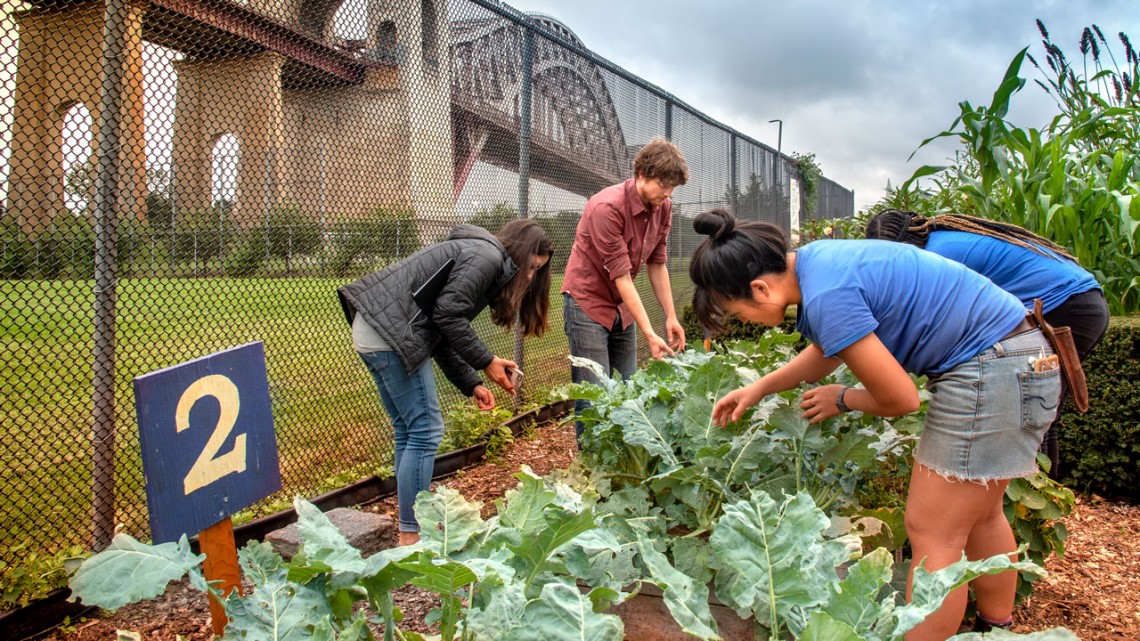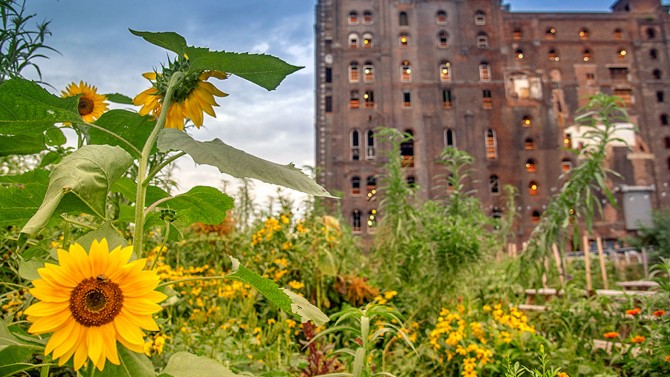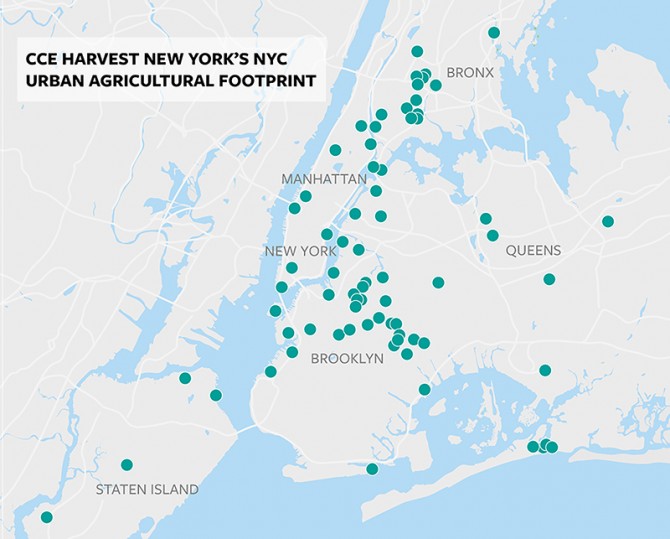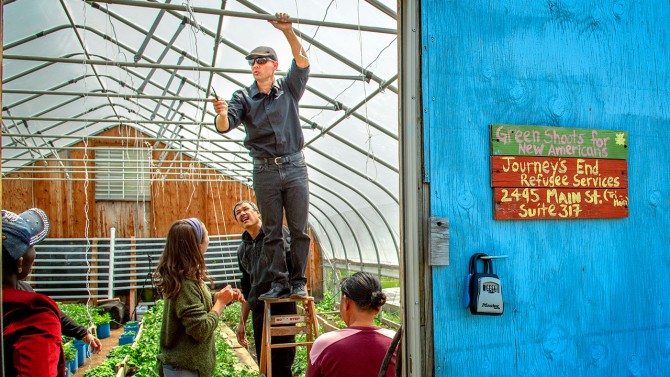
In the shadow of New York City’s Hell Gate Bridge, Cornell Cooperative Extension urban agriculture specialists Yolanda Gonzalez, left, and Sam Anderson, center, scout for harlequin bugs and consult with farmers at Randall’s Island Urban Farm.
CCE sows seeds to grow urban agriculture
By R.J. Anderson
From the rooftops of New York City to the sidewalks of inner-city Buffalo, urban farms are sprouting vegetables, fueling businesses and helping grow vibrant communities across the Empire State. Working these small plots are farmers young and old, from backgrounds as diverse as their agricultural needs and challenges.
Helping urban farmers make the most of confined spaces and unique growing conditions are specialists from Cornell Cooperative Extension (CCE).
In New York City, CCE Harvest New York urban agricultural specialists Sam Anderson and Yolanda Gonzalez travel from their Brooklyn office by bus, subway and ferry to deliver educational programming and on-site technical assistance in all five boroughs to commercial vegetable growers and nonprofits operating urban gardens.
“I love working in agriculture in this city because there’s such variety,” Anderson said. “One day we’re visiting an outdoor aquaponics setup where there’s goldfish on one side and okra growing in floating rafts on the other. Then the next day we’re visiting a rooftop farm with a view over the Hudson River, and the next we’re in the Rockaways, on a farm half a block from the beach.”
Anderson said those drawn to New York’s urban agriculture scene typically come from a gardening or activist background. And while they may have a strong interest in food or social justice, not many have commercial vegetable-growing experience.
“We fill that need by sharing the most recent plant science research,” Anderson said. “And we show them how to improve profitability by better utilizing limited growing spaces.”
Sharing safety best practices
Hosting workshops and one-on-one consultations, the specialists also help current and prospective urban farmers understand and adopt general food safety best practices while clarifying confusion around food safety rules such as GAP (Good Agricultural Practices) certification and the FDA Food Safety Modernization Act.
“We’ve found that most of these producers do not have a previously written food safety plan, which is critical for bringing product to market,” Gonzalez said. “Through our consults with local larger-scale urban farms on food safety certifications options, we’ve been able to open more doors for selling produce directly to distributors and retail outlets – including the new Wegmans supermarket slated to open in Brooklyn.”
Providing behind-the-scenes support, Harvest New York also consults with community urban gardens, helping those farms run smoothly as they address issues of food access, food sovereignty and empowerment.
“Well over half of the urban farms we work with are run by nonprofits or are otherwise community-oriented,” Anderson said. “Serving them has become a core part of our mission.”
That includes the Kelly Street Garden. For nearly five years the South Bronx community garden has provided a space for neighbors interested in getting their hands dirty, growing their own food and connecting with neighbors. In 2018, the Kelly Street Garden’s 2,500 square feet of raised growing beds produced more than 1,800 pounds of vegetables, herbs and flowers, which were donated to its neighbors.
Though she is an experienced organizer and teacher, Kelly Street Garden resident manager Sheryll Durrant admits her knowledge of horticulture is not deep. So when she has questions about disease and pest management, needs her soil chemistry tested and improved, or wants help planning a workshop, she calls Harvest New York.
“With Sam and Yolanda, there are no stupid questions,” said Durant. “I’m so appreciative to have access to experts who can actually explain the science in layman’s terms. There’s no substitute for that.”
Helping farmers in Buffalo
Nearly 400 miles away, Harvest New York team leader Judson Reid is assisting Buffalo urban farmers with roots all over the world. For almost four years, Reid, also a specialist with CCE’s Cornell Vegetable Program, has worked with the Green Shoots for New Americans Refugee Agricultural Program at its Brewster Street teaching farm.
Featuring raised beds and a high-tunnel hoop house, the tiny organic farm sits on a couple of inner-city blocks in a neighborhood with limited access to fresh fruits and vegetables.
There, newly resettled refugees from the Democratic Republic of the Congo, Nepal, Bhutan and Myanmar grow produce that is distributed locally through a CSA, at farmers markets and in nearby restaurants. The vegetables are also shared with families in the Brewster Street neighborhood.
“A lot of our participants have agriculture experience in their home countries, but it’s a little different here in regard to climate and some of the technical aspects,” said Jenna Walczak, the program’s farm manager. “Jud brings Cornell expertise that helps us decide when, where and what to plant, and we turn to him to troubleshoot plant disease issues.”
This collaborative, symbiotic environment helps Reid broaden his research.
“I love seeing the production techniques that I’ve worked with in rural settings employed in an urban setting,” he said. “For example, over the past five years I’ve been studying how to optimize high tunnels to extend the growing season and maximize profitability. On the Brewster Street farm, I’m able to apply those principles by showing the farm how to grow tomatoes using vertical trellises and utilize advanced integrated pest management and soil fertility techniques.”
Educators from CCE’s Erie County association join Reid in teaching participants basic agribusiness skills – such as managing a budget in terms of the inputs necessary to grow the crop, how should it be priced, and how much yield is necessary to be profitable.
“CCE’s role in New York state urban agriculture allows the organization to achieve its mission by putting research-based knowledge in the hands of people – in this case [people] who want to grow their own food to eat, or grow food as a business – and do so in a way that is environmentally and economically sound,” Reid said. “And we often find that urban agriculture gives people an opportunity to develop a sense of belonging and contribution to the greater community.”
R.J. Anderson is a communications specialist with Cornell Cooperative Extension.
Media Contact
Get Cornell news delivered right to your inbox.
Subscribe




